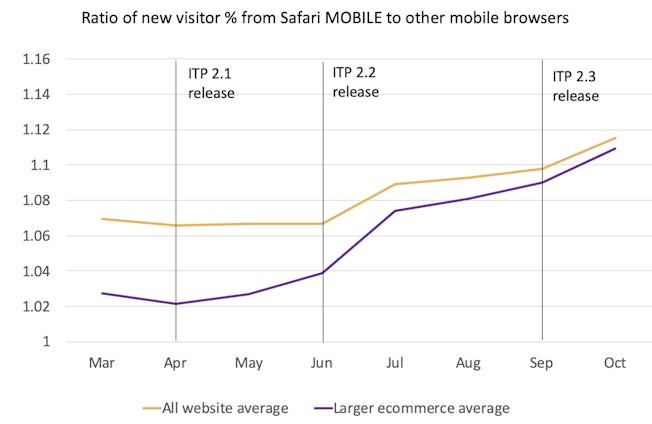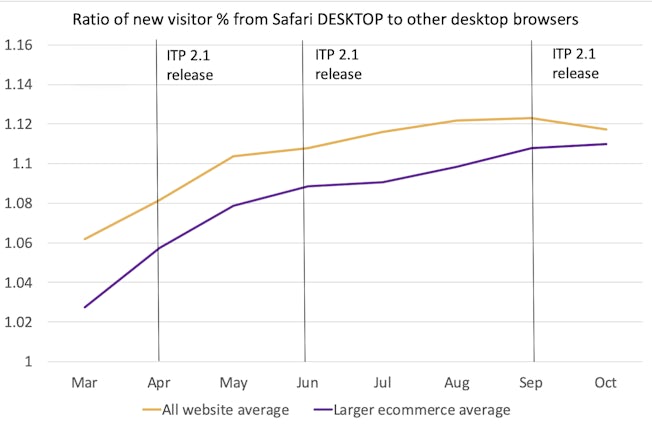https://econsultancy.com/what-impact-is-safari-itp-having-on-marketing-attribution/
After analyzing the actual impact ITP has had on 812 of the larger ecommerce stores working with us at Littledata, we’ve concluded that the cumulative impact is a significant 8% loss of marketing attribution for Safari mobile searches.
Littledata is now experimenting with a long-term solution to improve cross-session user tracking.
Recapping the changes with Safari in 2019
The Safari browser (from v12.1 onwards) deletes cookies and local storage used by Google Analytics (GA) and other platforms to identify the same user across multiple visits.
While this is apparently designed to protect user privacy, it actually hurts the ability of ecommerce stores to link their marketing spend to sales that occur in a subsequent site visit:
- March: Safari 12.1 rolls out, with Intelligent Tracking Prevention (ITP) 2.1 wiping cookies set more than 7 days previously
- May: Safari 12.2 released with ITP 2.2 wiping cookies set from a cross-domain link after 1 day
- September: Safari 13.0 released with ITP 2.3 clearing any local storage workaround after 7 days
Google Chrome is also following with its own enforcement of SameSite cookie policies, further limiting first-party cookies which are really third-party in disguise.
What’s the impact so far?
Our team looked at a group of 4,131 websites in total, and also 812 larger ecommerce stores with more than 20,000 visits per month.
The metric we chose is the ratio of the new visitors % on Safari browsers to the new visitors % on all other browsers. This accounts for changes in channel mix or browser used on an individual store.
If Safari treats the GA cookie for tracking visitors roughly the same as other browsers, we would expect that ratio to be around 1.

As the chart shows, since March 2019 the average new visitor ratio for Safari has increased every time an ITP update is released.
This means the cumulative impact over 6 months is an increase in the ratio for Safari of 8% from 1.03 to 1.11.
What does this mean for your site?
Assuming the percentage of new visitors on other browsers has been stable over the same period, this 8% rise in the ratio for Safari equates to an 8% drop in marketing attribution for Safari mobile.
Safari mobile represents 46% of all browser usage in North America. If your site is “average” in terms of traffic and user behaviour splits by mobile and desktop, that means you lost 4% of marketing attribution / visibility on mobile.
The biggest drop would have been seen in June and July 2019 with ITP 2.2. But what worries us more is the direction of travel: if the drop has been 8% in 6 months, how might this change as Safari further tightens the security around cookies, or the Chrome and Android web browser join in?
What about Safari desktop?
Safari desktop has lower usage than mobile (just 12% in North America), so the impact of changes is lower. Yet we still saw a similar 8% increase in the ratio for Safari desktop from 1.02 to 1.11.

The longer duration of first-party cookies on desktop browsers means that ITP 2.1 (limiting all tracking cookies to 7 days) had more of an impact, but it seems the impact from ITP 2.3 hasn’t yet been felt.
The link to particular releases also appears to be less defined. This is likely because desktop users are not pushed to upgrade Safari in the same way they are pushed to upgrade iOS on their phone.
Are these changes permanent?
Apple has made a strong point of user privacy over the last few years. Their billboard ad at the CES conference in Las Vegas last year makes that point clearly!
Apple never shows up at CES, so I can’t say I saw this coming. pic.twitter.com/8jjiBSEu7z
— DaddyPizza (@chrisvelazco) January 4, 2019
https://platform.twitter.com/widgets.js
Apple develops Safari to provide a secure web interface for their users, and with Intelligent Tracking Prevention (ITP) they intended to reduce creepy retargeting ads following you around the web. Genuine web analytics has just been caught in the cross-fire.
Since Apple makes none of its revenue from advertising or analytics directly, and makes a LOT of money from users trusting it’s device security we believe this assault on user tracking will continue. And what users become to expect on Apple devices may in time spread to all internet browsers.
How can you get the tracking back?
Most of the previous workarounds for Safari ITP 2.1 will not work for ITP 2.3, since they rely on using browser local storage to avoid cookie limitations.
Luckily, there is a way to improve Safari tracking. If the cookie storing the anonymous ID across different visits is set by a web server rather than JavaScript on the browser, this cookie is trusted by Safari. In this case, the cookie is treated like a login cookie set by your own servers – and so we believe this solution is future-proof
With the secure cookie safe from ITP’s purges, the number of new visitors on Safari would fall as more users are linked across sessions. Marketing attribution to campaigns would then rise (as opposed to direct traffic attribution) as the typical user journey grew longer.
How to implement improved Safari tracking
To make this work you would need to spin up a web server which accepts a request from the browser to set a more persistent cookie, and then adapt your Google Analytics tracking script to use the ID from this server-set cookie rather than letting GA create a new one. This will work with gtag tracking for Google Ads as well.
If you’re looking for a simpler way, at Littledata we have a ‘Trusted Cookie’ product in private beta. It provides an endpoint on littledata-cookie.yourdomain.com to set a trusted cookie, and an adapted script for GTM.
The same principle can also be extended to improve tracking for Facebook Pixel, Segment, etc. The only downside we can see in implementing this is having to maintain the adapted tracking script if Google makes another update (like they did for gtag), and the cost for running the web servers.
But in exchange, you get to link 8% more of your marketing campaigns to sales. If you spend more than ten thousand a month on traffic acquisition, just think what that could be worth to you.
More Econsultancy resources on ITP and measurement:
The post What impact is Safari ITP having on marketing attribution? appeared first on Econsultancy.
Be First to Comment